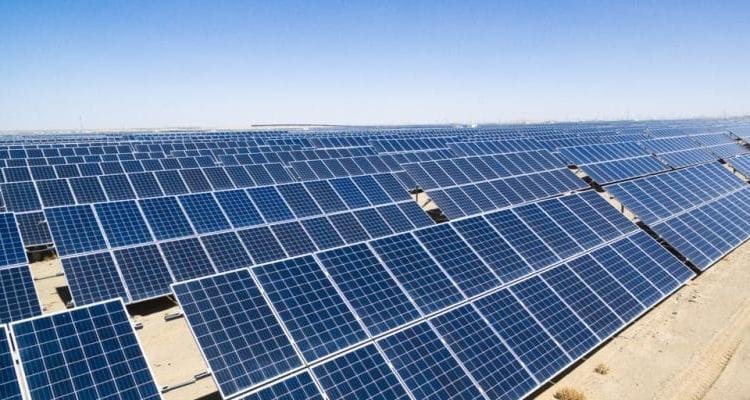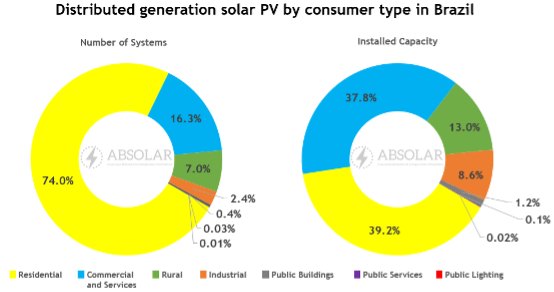Member/Partner News
Solar photovoltaic surpasses 8 gigawatts in Brazil, ABSOLAR informs

Since 2012, solar brought more than R$ 41 billion in new investments to the country, creating more than 240 thousand accumulated jobs
New analysis by the Brazilian Solar Photovoltaic Energy Association (ABSOLAR) points out that Brazil has just surpassed the historic milestone of 8 gigawatts (GW) of solar photovoltaic (PV) operational installed capacity, in large power plants and small and medium-scale systems installed on rooftops, facades and plots of land. Since 2012, the source has brought more than R$ 41 billion in new investments to the country and has generated more than 240 thousand accumulated jobs.
In the centralized generation segment, Brazil has an installed capacity of 3.1 GW in solar PV power plants, which represents 1.7% of the country´s electricity matrix. In 2019, solar PV energy was the most competitive among all renewable sources in the two New Energy Auctions hosted by the government that year, A-4 and A-6, with average prices below US$ 21.00/MWh.
Large-scale solar PV is currently the seventh largest power source in Brazil, with power plants in operation in nine Brazilian states, in the Northeastern (Bahia, Ceará, Paraíba, Pernambuco, Piauí and Rio Grande do Norte), Southeastern (Minas Gerais and São Paulo) and Central-Western (Tocantins) regions. Accumulated investments in this segment surpass R$ 16 billion.
Adding installed capacities of distributed and centralized generation segments places the photovoltaic solar source in the sixth position of the Brazilian electricity matrix, behind hydroelectricity, wind, biomass, natural gas and diesel and other fossil fuels termal plants. The solar source already represents more than the sum of all installed capacity of coal-fired power plants and nuclear plants, which totals 5.6 GW.
In the distributed generation segment, solar PV reached an installed capacity of 4.9 GW, bringing to Brazil over R$ 24 billion in new investments since 2012, spread throughout the five national regions. Solar PV represents more than 99.9% of the number of distributed generation systems and leads the distributed generation segment by a wide margin.
Residential consumers lead the number of installed systems, representing 74.0% of the total. They are followed by companies in the commercial and services sectors (16.3%), rural consumers (7.0%), industries (2.4%), public buildings (0.4%) and other kinds, such as public services (0.03%) and public lighting (0.01%).
In terms of installed capacity, residential consumers lead the use of solar photovoltaic energy, with 39.2% of the installed capacity in the country, closely followed by consumers in the commercial and services sectors (37.8%), rural consumers (13.0%), industries (8.6%), public buildings (1.2%) and other kinds, such as public services (0.1%) and public lighting (0.02%).

According to ABSOLAR, there are more than 411 thousand solar PV systems connected to the grid in Brazil, bringing financial savings and improved environmental sustainability to over 515 thousand consumer units. Solar PV technology is present in all Brazilian states, with the leaders in installed capacity being, respectively: Minas Gerais (887.1 MW), São Paulo (613.6 MW), Rio Grande do Sul (601.8 MW), Mato Grosso (360.9 MW) and Paraná (285.3 MW).
“Despite the advancements in the last years, Brazil – which has one of the best solar resources in the planet – still uses a very small share of solar PV, especially in distributed generation, where only 0.6% of the more than 86 million electricity consumers use the sunlight to generate electricity”, states Ronaldo Koloszuk, chairman of ABSOLAR's Board of Administrators.
“In the 2015 and 2016 economic crises in Brazil, the country’s GDP was below -3,5% per year, but the solar photovoltaic sector grew over 100% each year, helping the recovery of the country. Despite the most acute phase of the COVID-19 pandemic in Brazil, solar PV is supporting the economic growth on federal, state and local levels. Solar PV is definitely part of the solution, both to our society and to the environment”, adds Koloszuk.
According to ABSOLAR’s CEO, Rodrigo Sauaia, solar energy will have an increasingly strategic role for the country to meet its economic development goals, especially in order to help the economy recovery after the pandemic, as it is the biggest renewable energy source in terms of job generation in the world.
“Solar PV reduces the electricity cost for the population, increases the competitiveness of companies and unburdens the budget of the public sector, bringing benefits to small, medium and large energy consumers in the country.
The solar photovoltaic sector works to accelerate the renewable expansion of the Brazilian electric matrix, at competitive prices. We are the cheapest renewable source in Brazil and we will help the country to grow with increasing competitiveness and sustainability”, points out ABSOLAR's CEO, Rodrigo Sauaia.”, points ABSOLAR´s CEO, Rodrigo Sauaia.
![Global Solar Council [logo]](/static/images/gsc-logo-horizontal.svg)